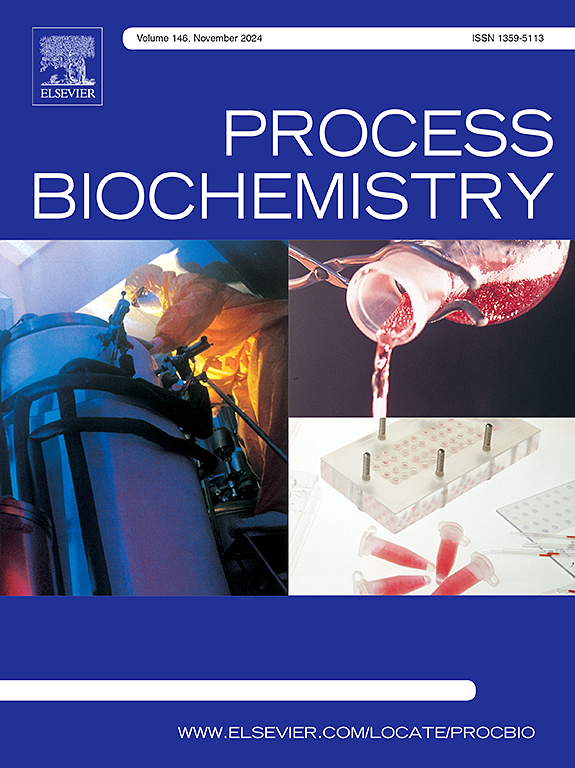在高固含量条件下,酶补充对提高预处理稻秆纤维素和半纤维素转化率的影响
IF 4
3区 生物学
Q2 BIOCHEMISTRY & MOLECULAR BIOLOGY
引用次数: 0
摘要
木质纤维素生物质高固相酶解的有效策略对于生产富含糖的水解物至关重要。在此基础上,以20 % w/v的预处理稻秆为原料,在摇瓶中考察了添加不同量(5 ~ 60 mg蛋白质/g半纤维素)的celllic CTec2对纤维素(GCY)和半纤维素转化率(HCY)的影响。在最佳粘酶L负荷(15 mg蛋白/g半纤维素)下,GCY和HCY分别达到87%和66. %。然后,采用锚式叶轮反应器进一步改善了糖的释放。最终得到的水解产物由(g/L):葡萄糖(~ 85)、木糖(~ 38)和阿拉伯糖(~ 8)组成,最终由guilliermondii假丝酵母FTI 20037酵母发酵,显示出葡萄糖的高效(96 %)和体积产率(2.06 g/L/h)。因此,在非常规反应器中添加市售酶可提高高固体酶水解的性能,并可能成为工业应用的有前途的策略。本文章由计算机程序翻译,如有差异,请以英文原文为准。
Enzyme supplementation as a strategy for enhancing the cellulose and hemicellulose conversion yields at high solids content of pretreated rice straw
An efficient strategy for the high-solids enzymatic hydrolysis of lignocellulosic biomass is crucial for producing a sugar-rich hydrolysate. In this sense, the effect of Viscozyme L supplementation at different loads (5 – 60 mg protein/g hemicellulose) of Cellic CTec2 on cellulose (GCY) and hemicellulose conversion yield (HCY) was evaluated, using 20 % w/v of pretreated rice straw in shake flasks. At optimum Viscozyme L load (15 mg protein/g hemicellulose), 87 and 66 % of GCY and HCY were achieved, respectively. Then, the release of sugars was further improved by using an anchor-type impeller reactor. The resulting hydrolysate, composed of (g/L): glucose (∼85), xylose (∼38), and arabinose (∼8), was finally fermented by Candida guilliermondii FTI 20037 yeast, showing high efficiency (96 %) and volumetric productivity (2.06 g/L/h) from glucose. Therefore, supplementation with commercially available enzymes in a non-conventional reactor improved the performance of high-solids enzymatic hydrolysis and could be a promising strategy for industrial applications.
求助全文
通过发布文献求助,成功后即可免费获取论文全文。
去求助
来源期刊

Process Biochemistry
生物-工程:化工
CiteScore
8.30
自引率
4.50%
发文量
374
审稿时长
53 days
期刊介绍:
Process Biochemistry is an application-orientated research journal devoted to reporting advances with originality and novelty, in the science and technology of the processes involving bioactive molecules and living organisms. These processes concern the production of useful metabolites or materials, or the removal of toxic compounds using tools and methods of current biology and engineering. Its main areas of interest include novel bioprocesses and enabling technologies (such as nanobiotechnology, tissue engineering, directed evolution, metabolic engineering, systems biology, and synthetic biology) applicable in food (nutraceutical), healthcare (medical, pharmaceutical, cosmetic), energy (biofuels), environmental, and biorefinery industries and their underlying biological and engineering principles.
 求助内容:
求助内容: 应助结果提醒方式:
应助结果提醒方式:


